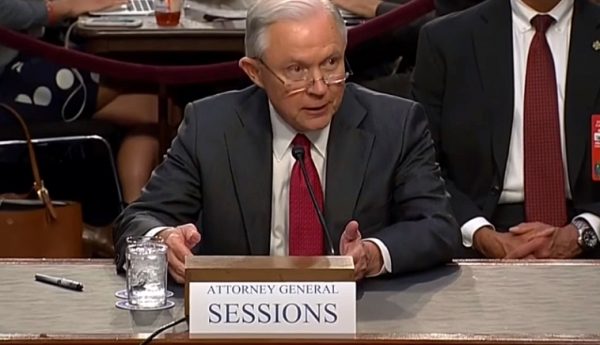Last week Attorney General Jeff Sessions set off a firestorm when he announced he was reversing an Obama-era policy that instructed federal prosecutors not to target states and individuals where recreational marijuana had been approved by voters.
The decision led Natural News founder Mike Adams, the Health Ranger, to rightfully call on Sessions to resign, given that the Justice Department he runs is currently targeting President Donald J. Trump for a bogus “Russia collusion” allegation.
“By declaring war on legalized cannabis, Jeff Sessions demonstrates once and for all that he is hopelessly out of touch with America and incapable of focusing on the far greater priorities of investigating Uranium One and FBI corruption,” Adams said.
As it turns out, though the policy reversal stands, it very well might not mean much in practical terms, according to experts and former federal prosecutors.
Joseph diGenova, a former U.S. attorney for the District of Columbia in the 1980s when Sessions was serving in the same capacity in Alabama, told Lifezette that Sessions’ memo to prosecutors makes it clear they will have discretion over which cases to bring.
“Not much is going to change except the policy,” he said. (Related: As California legalizes pot, few smokers realize cannabis is often contaminated with pesticides, mold, heavy metals and chemical toxins.)
James Cole, the deputy attorney general under AG Eric Holder, penned a memo in 2011 that directed the Justice Department to all but ignore businesses that were licensed to sell pot under state laws that legalized the drug.
That directive remained the priority so long as states worked to stop the spread of marijuana from their jurisdiction to other states where voters had yet to legalize it while preventing pot sales to children.
When he rescinded the policy, Sessions instructed U.S. attorneys to enforce drug laws as enacted by Congress and, well, marijuana for recreational use remains against federal law. Sessions said that the Obama-era policy undermined “the rule of law and the ability of our local, state, tribal, and federal law enforcement partners to carry out this mission” of combating illegal drugs.
“Therefore, today’s memo on federal marijuana enforcement simply directs all U.S. attorneys to use previously established prosecutorial principles that provide them all the necessary tools to disrupt criminal organizations, tackle the growing drug crisis, and thwart violent crime across our country,” he wrote.
Needless to say, the policy change has sparked outrage from lawmakers in states that have legalized its recreational use.
As Lifezette reported, Rep. Ted Lieu, D-Calif., tweeted, “A list of things more important for federal prosecutors and federal law enforcement to pursue other than marijuana: 1. Basically anything.” (I wonder, Mr. Lieu, does that also include enforcement of all immigration laws?)
Rep. Earl Blumenauer, D-Oregon, tweeted that the policy change is “outrageous” and “perhaps one of the stupidest decisions the attorney general has made.”
Sen. Rand Paul, R-Ky., an ally of Sessions and Trump, nevertheless disapproved. “I think it’s a mistake for the Department of Justice to do this,” he told Fox News’ Laura Ingraham.
But he also said enforcement “will be virtually impossible. They would have to send an army [of] federal troops in there.”
That isn’t going to happen, said diGenova. Rather, he predicts that federal prosecutors will be focusing their limited resources on marijuana trafficking by criminal organizations and drug gangs.
“There is going to be a black market,” he predicted. “Because of taxation and the cost of packaging and quality control, there will be a very, very large black market.”
In some ways Sessions’ decision is understandable; it is against federal law to use marijuana recreationally. And if we’re going to be upset about other administrations selectively enforcing federal laws against, say, mishandling of classified information, then we can’t allow the current administration to selectively enforce laws, either.
But there is a solution and Paul hit on it during his Fox interview: Have Congress change the law to let states decide what they want to do.
That’s called “federalism,” and it is one of our founding principles of government.
J.D. Heyes is a senior writer for NaturalNews.com and NewsTarget.com, as well as editor of The National Sentinel.
Sources include:
Lifezette.com
NewsTarget.com
NaturalNews.com



















